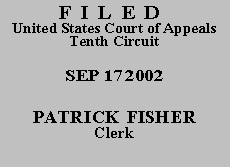

| UNITED STATES OF AMERICA,
Plaintiff - Appellee, v. RICHARD K. HORNEY, Defendant - Appellant. |
|
Richard K. Horney appeals from the district court's determination that he violated the terms of his supervised release and its imposition of a prison term of nine months. We affirm.
Horney was convicted of conspiracy to distribute 500 grams or more of cocaine in the Western District of Missouri and was sentenced in 1997 to a prison term of thirty months followed by a three-year term of supervised release. He began his period of supervised release in October 1998. In September 1999, jurisdiction over his case was transferred to the District of Colorado. On October 1, 2001, Horney's probation officer filed a petition to revoke supervised release for possessing and using cocaine. The officer filed a supplemental petition on November 8 adding charges that Horney had committed a variety of motor vehicle violations for which he had recently been arrested, including driving under the influence of alcohol. Horney pleaded guilty to driving while ability impaired by alcohol in a state court on January 9, 2002.
At his supervised release revocation hearing on March 4, Horney admitted to the cocaine and alcohol offenses, which were Grade C violations of his supervised release. The cocaine offense mandated revocation of supervision. 18 U.S.C. § 3583(g). Under the Sentencing Guidelines' policy statements for violations of supervised release, and given his category IV criminal history, Horney was subject to six to twelve months' imprisonment. The district court sentenced him to nine months.
On appeal, Horney's counsel has filed a brief pursuant to Anders v. California, 386 U.S. 738 (1967) (requiring counsel who finds an appeal wholly frivolous to so advise the court, request permission to withdraw, and provide an accompanying brief referring to anything in the record that might arguably support the appeal). Accordingly, Horney's appellate counsel requested permission to withdraw as counsel and provided a brief identifying a potential issue but noting the appeal was without merit. Horney filed a response to the Anders brief raising one issue and conceding that the issue raised by counsel was frivolous.(1) The government did not file a brief.
In his brief, Horney contends that the government violated Fed. R. Crim. P. 5 and his due process rights by holding him in detention for almost four months without bringing him before a magistrate judge or allowing him access to counsel. It does appear that Horney somehow got lost or forgotten in the county jail in which he was initially being detained on his driving-related charges. After he made bond on these charges on October 16, 2001, he remained in the jail on a federal warrant for violation of his supervised release. On January 9, 2002, he was sentenced on his driving-while-ability-impaired conviction and was given credit for the time he spent in jail after October 16. However, he was not brought before a federal magistrate judge, and counsel was not appointed for him, until February 6, 2002, despite the fact he was in custody under the federal warrant after October 16.
Because Horney did not raise these arguments in the district court, we review for plain error. See United States v. Avery, 295 F.3d 1158, 1181-82 (10th Cir. 2002). Under Fed. R. Crim. P. 32.1(a)(1), which applies to Horney's situation rather than Rule 5,(2) a person held in custody for violation of a condition of supervised release must be afforded a prompt hearing on probable cause supporting the custody before a judge or magistrate judge. Violation of this Rule, however, does not warrant overturning the revocation decision or resulting sentence unless the defendant demonstrates prejudice from the delay in holding the probable cause hearing. Cf. United States v. Nazarenus, 983 F.2d 1480, 1483 (8th Cir. 1993) (interpreting analogous Rule 5); United States v. Causey, 835 F.2d 1527, 1529 (5th Cir.1988) (same). Horney has failed to identify any prejudice resulting from the failure to hold a more prompt hearing. He has also failed to identify any prejudice resulting from the delay in appointing counsel, which is similarly required for him to obtain relief on that basis. See United States v. Mays, 69 F.3d 116, 123 (6th Cir. 1995). Horney's claims thus have no merit.
Pursuant to our duty under Anders, we conducted an independent review of Horney's revocation proceedings and we agree that the appeal is frivolous. The judgment of the district court is AFFIRMED. Counsel's motion to withdraw is GRANTED.
Entered for the Court
Senior Circuit Judge
*. This order and judgment is not binding precedent, except under the doctrines of law of the case, res judicata, and collateral estoppel. The court generally disfavors the citation of orders and judgments; nevertheless, an order and judgment may be cited under the terms and conditions of 10th Cir. R. 36.3.
1. The broad issue counsel raised was whether the district court erred in imposing a nine-month sentence. Counsel noted that Horney was not entitled to credit against his federal sentence for the time he had spent in county jail because he had been given credit for that time against his state sentence. See 18 U.S.C. § 3585(b). We agree with Horney and his counsel that this issue is frivolous.
2. Rule 5 applies to initial appearances following an arrest.